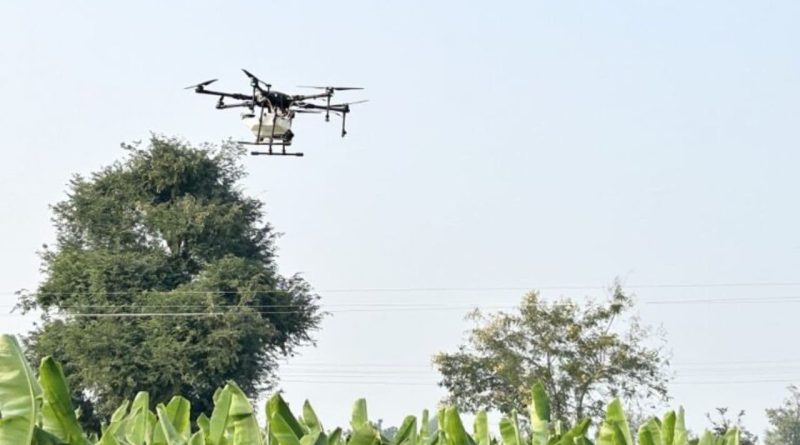Maharashtra Banana Farmers Embrace Drone Technology for Efficient Spraying, Empowered by Marut Drones
In the heart of Jalgaon district, Maharashtra, farmers are turning to cutting-edge drone technology to protect and enhance their crops. With the support of Marut Drone Academy, they are addressing critical challenges in banana and cotton farming, paving the way for a more efficient and sustainable agricultural future.
The Challenge of Banana Farming: Combating Fungal Diseases
Banana crops in Jalgaon can grow up to 10 feet in height, making traditional methods of pesticide spraying labor-intensive and inefficient. Farmers face the constant threat of fungal diseases like Karpa, which causes leaf blight and reduces the number of functional leaves on banana plants. Without proper pesticide application, the growth and yield of banana plants are severely impacted.
Niranjan, a trained drone pilot from the region, has become a beacon of hope for local farmers. After receiving training at Marut Drone Academy, he now uses drones to spray pesticides over banana plantations. “I used to struggle with labor shortages and the difficulty of spraying such large crops manually. Now, with drones, I can spray much faster and more effectively,” Niranjan explains. His expertise has not only improved his own farm’s productivity but has also benefited neighboring farmers engaged in banana and cotton cultivation.
Cotton Farming: Tackling Bundai Disease with Drones
Cotton farmers in Jalgaon face their own set of challenges. The Bundai disease, common in cotton plantations, significantly damages crops by reducing the weight of cotton and hindering flowering. Traditionally, farmers relied on manual labor to spray pesticides, which posed serious risks to workers. Laborers were often unwilling to enter fields where pesticides had to be applied, especially when crops were dense or when fields needed spraying after rainfall.
Marut’s drones have emerged as a game-changing solution. These drones can cover up to 5 acres in just one hour, a task that would take manual laborers an entire day. This efficiency is particularly crucial during the rainy season, as pesticide consistency often breaks down in wet conditions. With drone spraying, crops absorb fertilizers within one hour, ensuring effective treatment even if the weather changes. In contrast, manual spraying requires at least one day per acre, and its effectiveness diminishes if it rains the next day.
Maize Farming: Reducing Risks from Snakes
For maize farmers in the region, drones are proving invaluable in addressing another significant threat: snakes. Snakes pose a major risk to farmers and laborers working in the fields. Drone spraying eliminates the need for workers to enter the fields, significantly reducing the risk of snake bites and ensuring safer farming practices.
Overcoming Challenges: The Need for Government Support
Despite the numerous benefits, the adoption of drone technology has faced hurdles. Limited government subsidies for drones have slowed their widespread use. Farmers like Niranjan remain hopeful that these obstacles will soon be overcome. “The technology is truly a game-changer. It has saved us time, reduced labor costs, and increased the efficiency of our pesticide application. I believe that with more support and awareness, we can see even more widespread use of drones in our region,” he says.
Empowering Farmers Through Training
Marut Drone Academy has played a pivotal role in empowering local farmers. Their drone pilot training programs equip farmers like Niranjan with the skills needed to operate drones effectively. By enhancing productivity and reducing reliance on manual labor, these programs are transforming the agricultural landscape in Maharashtra.
The Future of Farming: A Sustainable and Efficient Approach
As the adoption of drone technology continues to grow, it holds the promise of revolutionizing agriculture in Maharashtra. From combating diseases to reducing labor costs and improving safety, drones are making farming more efficient, sustainable, and safer for all involved. With continued support and innovation, the future of farming in Jalgaon looks brighter than ever.

